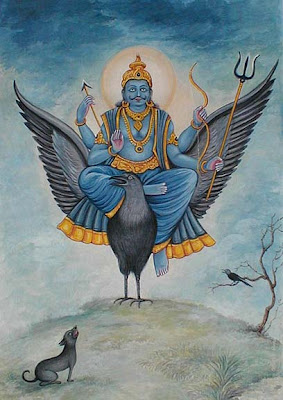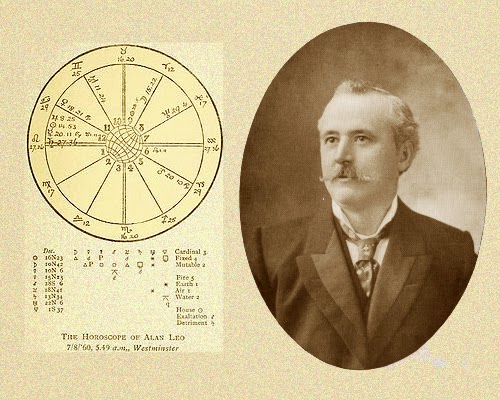Saturn is in its sidereal exaltation in Libra until November. Some thoughts on his influence from my book Saturn, Fatal Attraction.

Western astrology takes its symbolic cues from ancient Greece and Rome, but the motifs of Saturn have parallels in myths from all over the world. For example, Saturn has a great deal in common with the Yogic concept of Maya. Maya is the interplay of the whole material world, which at the most exalted spiritual level is realised as illusory. Buddhists may recognize this as pure Mind; an objectified cosmic dream, which ultimately is only dispelled by reaching Enlightenment. Perhaps it is unfair to saddle any one planet with this burden, but Saturn is the ruler of base materialism and the temporal world. This is consistent with the portrayal of Maya as the trickster who ensnares us in his web and the personalised Biblical representation of the Devil himself. Eastern philosophy says that the appearance of Maya is due to ignorance, which is in turn the ultimate cause of suffering. The level of understanding at which we perceive Maya determines the extent to which it is real. So at last, the world is pure ideal, but few of us live from day to day at this supreme level.
Saturn, in either his natal or transiting position brings us up against apparent obstacles and frustration, but like the experience of Maya, these boundaries are in fact only provisional. We give Saturn’s shadowy limitations greater substance to the extent that we identify and run away from them. The restrictions of fate and time are relative, and by working positively and facing the challenges, a man eventually makes himself free of Saturn’s bonds. A stressfully aspected natal Saturn is one that cannot operate without a certain amount of adjustment, which makes effort more intimidating, and results take longer to achieve. But working at Saturn in any condition is never time wasted. Ensnaring ourselves in a tangled, tenuous world on the other hand, around the refusal to recognise the consequences of our own behaviour, is the worst possible approach, as is illustrated by the myth of Saturn-Chronos.
Chronos
To recap: The Greek Saturn, Chronos, took his mother Gaia’s part against his tyrannical father, Uranus, the Sky God. Using the sickle given to him by Gaia, Chronos castrated his father and usurped his title King of the Gods. Chronos then held supreme power, though with his head lying uneasily for constant fear that someone would in turn overthrow him. He proceeded to eat all of his children to prevent a celestial palace coup, which did not endear him to his wife Rhea, who hid their son Jupiter until he was strong enough to stand up to the old man. Young Jupiter then brought his father’s fears crashing back to him by seizing power, banishing Chronos to the earth and establishing himself as the Olympian King.
A good story, but what does it all mean? There are many interpretations, among which the idea of the ‘Sins of the Father’ is instructive. Saturn hated his father and rebelled against him, yet he re-enacted the same pattern with his own children, with the same disastrous consequences. Whether it is a strictly fated occurrence, or a product of environment and conditioning, how often do people fall into exactly the parenthood traps that they vowed never to repeat? Or, like Chronos, they feared their own parents and feel it incumbent to ensure that their own children are frightened of them. On a more esoteric level, karma is in fact handed down through bloodlines. When a father dies, the unresolved karma from his last lifetime is passed on to the next available material vessel, his children.
Pandits performing a Saturn puja
The myth also says something about Saturnian ambition and his willingness to take responsibility: Chronos decided that something needed to be done about Uranus and at the same time, saw an opportunity to make something of himself. This is characteristic Saturn-influenced behaviour. Saturn defines himself in terms of status or standing, and will go to great lengths to accomplish his goals. It does not always mean taking such large risks as Chronos, but opportunism is a big motivation. Once a man has arrived in a position of authority, he may become a beneficent boss, or an overbearing despot. Either he helps others get along, or pulls the ladder of opportunity up after him, for fear of being emulated or overtaken. The wise Saturnian chief realises the karmic consequences of his actions and that by helping others he helps himself. As the I Ching says, ‘To rule truly is to serve’.
Chronos’s attitude towards his children also illustrates the Saturnian propensity to hate or reject the things that we have created. People also hate the things that they fear, so Saturn frequently represents a fear of creativity or self-expression. We wish for a lasting legacy through our Saturnian effort, but the struggle to give birth to an idea, career, or any attainment at all has been so difficult that we have little subsequent love for it. Likewise, once Saturn has transited a natal house, we are heartily sick of its mundane affairs for a long time afterwards.
Most of all, though, the myth of Chronos depicts Saturn’s capacity for projection through fear. Saturn toppled his own father, which means someone will topple him and at some guilty, half-conscious level he knows it. He tries to avoid his fate by controlling his environment, and becomes a tyrant in the same way as his father. If he had been a more modern parent and perhaps talked to his children instead of eating them, Chronos may have remained King, but perhaps even Gods have their high-level karma to live out. Fear manifests itself, and the steps Chronos took to avoid his fears only set up the inevitability of them coming about.
Psychologically speaking, it is common to see Saturnian problems on the birth-chart mirroring the mythic Chronos and stemming from negative projections about the world that become cruel self-fulfilling prophecies. This is classic Saturn in his archetype as the Devil or trickster. The stratagems and mechanisms used to avoid the perceived pain and problems of Saturn, as represented by his sign, house and aspect, appear to be the very things that bring them about. Avoidance of Saturn, or of fate if we prefer, eventually leads to a degree of overcompensation, and here we are caught in the very behaviour we are most afraid of. Saturn causes most hardship when acted upon, or reacted to out of fear, and while we may experience difficulties in any case, looking at Saturn as if through the gaps in our fingers virtually guarantees we bump into every possible obstacle. The image of fate is like being pursued by a speeding train: we can run away for a while, but it will surely catch up and it is much easier if we simply jump aboard. The changes will happen anyway.
To use a very simple example, people with Saturn in Pisces or perhaps the Twelfth house ouhouare said to be afraid of institutions and confinement. So they may refuse a doctor’s appointment if there is the slightest fear they will have to go to hospital. This continues until it becomes absolutely imperative they be committed, where they end up spending far longer than if they had been checked out at the first sign of trouble. Or take the individual with Saturn in Aries who is frightened of asserting himself. He fears that nobody will like him, yet he manifests this fear and becomes unpopular by boorishly overcompensating for his natural reticence. There are numerous mundane examples of this Saturnian projection: people carry guns or knives for fear of meeting somebody else as paranoid as themselves. In political life, a government’s defence budget is in direct proportion to the amount of fear prevalent in the world. Yet the more arms are created, the more the sum of global anxiety increases. There is a fine line between facing fear and the sense of hubris and reckless overcompensation that are its opposites.
Saturn’s tale is set against the backdrop of his father and his children, but echoes of the myth are not restricted solely to family scenarios. People coming up the hard way in their career often achieve success through precisely the early privation and lack of emotional stroking signified by Saturn. ‘Sweet are the uses of adversity’ perhaps, except the fruits are often rather sour. A chip on the shoulder, perhaps in the form of a prominent square or opposition to a personal planet, provides the future Saturnian big shot’s incentive for success. Using his discontent for positive motivation is very well, except the sense of perpetual grievance may remain even after he has ‘made it’. Upon arrival in the Promised Land, the thrusting Saturnian type turns the tables on his former oppressors, which in his distorted reckoning includes almost everyone, by way of projecting his shadow outwards. Nobody is left in any doubt who is the new boss. If he becomes a truly tyrannical figure, he may set himself up for a fall after the fashion of Chronos, but this is of course Shadow-influenced behaviour at its very worst. Difficult natal aspects from Saturn need not manifest this fully-blown megalomaniac sense, but Saturn’s myth merely provides a cautionary tale of behaviour to guard against.
There is a kind of reverse sympathy at work here – a fatal attraction or unsympathetic magic that determines that a man’s unconscious, unwanted scenarios get played out despite himself. No matter how unfashionable or unpalatable, there is a suggestion that the experimentation undergone through Saturn’s lessons cannot be completely avoided. We are all conditioned by karma to some extent. While confining him to the closet merely means that Saturn is expressed in a negligent or unwitting way, if Saturn signifies fated occurrences and work that has to be done, then there is nothing to be gained by trying to avoid the issues that he represents on the birth-chart. Boundaries and hard work are necessary elements to life too, and evasive manoeuvres usually mean the portal door swings back doubly hard on the rebound.


